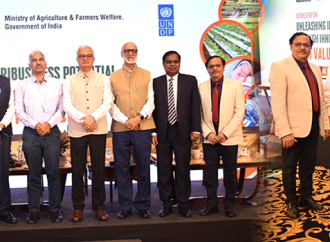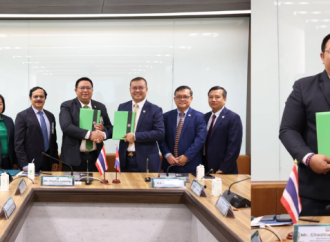Dr. Thomas Elhaut, Director, IFAD Asia Division; Mr. Tae-Young Kim, President & CEO, Banking & Insurance of the National Agricultural Cooperative Federation Dr. Ganesh Thapa, Regional Economist, IFAD Asia Division Mr. Benedicto Bayaua, APRACA Secretary General Distinguished CEO and Senior Officers of APRACA member institutions, NACF officers Guests, Ladies and Gentlemen: Good Morning. Appreciation to
Dr. Thomas Elhaut, Director, IFAD Asia Division;
Mr. Tae-Young Kim, President & CEO, Banking & Insurance of the National Agricultural Cooperative Federation
Dr. Ganesh Thapa, Regional Economist, IFAD Asia Division
Mr. Benedicto Bayaua, APRACA Secretary General
Distinguished CEO and Senior Officers of APRACA member institutions, NACF officers
Guests, Ladies and Gentlemen: Good Morning.
Appreciation to NACF
It is my distinct pleasure to welcome you to this third IFAD-APRACA FinPower Regional CEO Forum on the Impact of the Global Financial Crisis on Key Rural Finance Stakeholders in Asia. We are indeed happy that NACF, under the leadership of Chairman Choi Won-Byung (whom we will meet tonight), has graciously accepted to host the twin activities.
Appreciation to IFAD
It is my pleasure also to interact with Dr.Thomas Elhaut, Asia Division Director, and Dr. Ganesh Thapa, Regional Economist, of the International Fund for Agricultural Development or IFAD. I understand that IFAD has been APRACA’s foremost and distinguished strategic partner. Between 1996 and 2001, IFAD provided a technical assistance grant to APRACA under the APRACA MICROSERV program to disseminate replicable rural finance models to a wider audience. Again in 2007, IFAD re-engaged APRACA under the five-year IFAD-supported Regional Program of Accelerating the Financial Empowerment of Poor Rural Communities in Asia and the Pacific through Rural Finance Innovations or dubbed simply as FinPower Program.
At the outset, I would like to place on record our deepest gratitude to Dr. Thomas Elhaut, IFAD Director of Asia Division, for his untiring efforts beyond the normal call of his office to spearhead change and development in Asia.
Chairmanship of APRACA
Dr. Do Tat Ngoc, who has been a very good friend of APRACA for many years and until recently, the APRACA Chairman, has retired from VBARD on June 15, 2009 and has since moved to the State Professor Title Council of Vietnam. Dr. Nguyen The Binh, former General Director of VBARD is now the VBARD Chairman. As the CEO/General Director of AgriBank, I have also been tasked by my bank to take over as the APRACA Chairman for the rest of the biennium till the 17th APRACA General Assembly in Tashkent in March or April next year.
I am therefore privileged and at the same time humbled by the position of APRACA Chairman, as I accept the challenges of the office. With your support, I hope to continue achieving the lofty goals and ideals of APRACA and contribute to the search for continuing excellence within the APRACA family.
The FinPower Regional Study
This FinPower forum is the third in a series of annual FinPower CEO conferences, the first having been held in Kunming, China in 2007, sponsored by ADBC China and the second in Hanoi, Vietnam last year, sponsored by AgriBank Vietnam.
In preparation for this forum, the Secretary General commissioned a study on the current global financial turmoil and how it affects the regulators, rural finance institutions, microfinance institutions, rural clients and civil society and donors. The study aimed at determining how these stakeholders have coped with the crisis and what their plans are in order to ensure the continued delivery of adequate and timely financial services to their target clients, particularly the marginal sectors in the region.
Several APRACA member institutions have responded to the call for national papers and I wish to publicly acknowledge them: the National Bank of Cambodia, NABARD India, Bank Indonesia, NACF Korea, APB Lao PDR, MADB Myanmar, State Bank of Pakistan, CDA Philippines, NAMMS Russia, BAAC Thailand, VBARD and VBSP Vietnam. We are also grateful for IFAD’s sharing of a regional paper co-authored by Dr. Ganesh Thapa on the same topic.
The Global Financial Crisis
The global financial crisis has remained a common challenge to all nations, affecting economies at various levels.
The results of the FinPower regional study concludes that our member institutions, in general, have shown good performance despite the global financial crisis in the region. Loan portfolios have expanded while an increasing number of clients are being provided financial services. Operational and financial self-sufficiencies indicate that many MFIs are covering their costs and generating positive margins from operations.
However, the period of rapid growth in the past decades could decline or be stalled depending on both internal and external factors affecting MFI or RFI performance. With the advent of the crisis, funding of non-deposit-taking MFIs could be a problem even as expansion plans have been discreetly cut down or postponed. A few MFIs though expect that business will pick up as a result of an increase in demand for loans.
If the global economy continues to worsen, there could be limited scope for RFIs and MFIs that are dependent on foreign funding for the extra liquidity that they need to sustain their lending activities and also to meet refinancing needs when loans from foreign sources become due in the near future. The global financial crisis has caused a liquidity shortage and credit crunch that will have more adverse impact on RFIs and MFIs that cannot mobilize deposits because of restrictions imposed by the country’s banking laws and regulations.
The downside risk is a loss of confidence in the domestic banking system, which may lead to a run on deposits. Prolonged recession in countries of the region will lead to more output loss and rising unemployment and a general weakening of urban and rural economies, which will reduce demand for products and services offered by micro-enterprises and small businesses. Declining household incomes will eventually be felt by RFIs and MFIs in terms of falling loan repayment rates or rising delinquencies.
Further details of this regional study shall be presented during the forum proper.
Impact of the Global Financial Crisis on Vietnam
The negative influence of the Global Financial Crisis has resulted in a slowdown in the Vietnamese economic growth rate in 2008, from a planned GDP of 8.5%- 9% to the actual GDP growth of 6.23%.
Although the Vietnamese financial and banking system has not seriously suffered from the impacts of the Global Financial Crisis because it has been only at the beginning of integration, the connection between the Vietnamese financial and banking system and the international financial market have met some difficulties; international banking and financial transactions have decreased, affecting Viet Nam’s short term loans at banks and enterprises; hence, affecting profits and increasing NPLs.
In the context of the global economic recession, export market has fluctuated disadvantageously. Though the 2008 turn-over reached around USD 62.9 billion, a 29.5% increase compared with 2007, the increase was mainly the result of a rise in the price of goods in the international market rather than the rise in the quantity of goods.
Import turn-over reached USD 80.4 billion in 2008, increasing by 28% compared with 2007, mainly because of the increase in import price, in which the price of some rose to a high level such as: fertilizer price increased by 94.2%; petrol price 53.5%, and unprocessed steel price 45.8%.
The economic growth rate has slowed down. However, Viet Nam has the following basic advantages: stable socio-political conditions, great internal force and growth potential, expanded export markets, better reputation and relations in international arena, improved investment environment and Vietnamese and foreign investors’ belief towards economic development prospect.
Realizing the difficulties, challenges and advantages, Vietnamese government has applied five groups of policies:policies to boost up production, business and exports, policies for demand-stimulus of investment and consumption, fiscal and monetary policies, social welfare ensuring policies and enhancing management and organization policies.
The Vietnamese government has strived to ensure quality of life for people, sustainability in poverty reduction achievements and in achieving the Millennium goals of Viet Nam.
The Government continues to encourage investment to build houses for the poor, the beneficiary of social welfare, the laborers in centralized industrial zones, the pupils, students; assisting the laborers affected by economic downturn; lending without interest rate to help the unemployed and utilizing unemployment insurance policy pursuant to the Law of Social Insurance.
The Vietnamese government has fully realized difficulties and followed closely international market’s changes, applying strong, flexible and timely policies, particularly taking care of economic forecast and analysis; using market-based policies and tools to manage economy rather than the administrative measures. The government has also actively provided information and coordinated closely with news agencies for transparency in socio-economy information; improving social unity, people’s support, and investors’ participation and belief.
Vietnam in 2009
In general, the Viet Nam economy, despite difficult domestic conditions and the negative impact of international financial crisis, achieved positive results in the first quarter of 2009 in comparison with other countries.
In order to extricate such difficulties, the Vietnamese Government has worked out five key measures as follows: control the macro-economy, develop production and business, secure social welfare, ensure national security and defense, maintain the social stability and continue the administrative reforms, and prevent corruption,
AgriBank’s Role
The Viet Nam Bank for Agriculture and Rural Development (AGRIBANK), the largest State-owned commercial bank in Viet Nam, the number one firm in Viet Nam, plays a decisive and important role in agricultural and rural financial market. As of 31st March 2009, AGRIBANK’s total assets reached USD 24 billion; total funds resource was USD 23.2 billion, 93% of which was self-mobilized funds; the branch network consists of more than 2,200 branches and transaction offices nation-wide with nearly 34,000 staffs. The total funds providing to the agriculture and rural areas exceeded USD 11.8 billion, accounting for 71% of the total outstanding loans.
Along with banking activities, AGRIBANK currently has 8 independent subsidiaries operating in many fields like securities, gold and silver, financial leasing, insurance. With the advantage of a wide network, AGRIBANK can provide it products and services to all types of customers, especially the farming households including those in the remote and ethnic minorities’ areas. AGRIBANK has a customer base of 10 million households (out of the total 12 million in the country), 500 farms, over 100 cooperatives and more than 30,000 enterprises.
In the year 2008 and the first five months of 2009, in the context of complicated changes, even contrary movements are occurring to the world’s economy in general and Viet Nam’s in particular, AGRIBANK has maintained its stability and development as well as its leading role in stabilizing the financial market, making a considerable contribution into the inflation curbing efforts in the first half of 2008 and economic downward prevention in second half of 2008 and early months of 2009.
In early 2008, AGRIBANK implemented various solutions in order to stave off inflation, stabilize the macro economy and ensure the socio-security and sustainable development.
Since the fourth quarter of 2008, involving in the implementation of policies dealing with economic recession, AGRIBANK has broadened its lending at low interest rate. AGRIBANK has accepted the profit decrease of USD 117 million to reduce the lending interest rate.
AGRIBANK has effected the Government’s “Demand stimulus” program by providing subsidized loans to individuals and institutions who borrow capital for production and business. From February to June 2nd 2009, The Bank has funded the program with USD 5.5 billion, accounting for 51% of AGRIBANK total turnover including USD 2.9 billion for farmers, agriculture and rural area, 2.4 billion of which is for households.
Besides, AGRIBANK gives the priority to fund allocation for agriculture and rural areas as well as customers who have export operation, meeting the capital demand of the committed projects and promoting consumption lending. AGRIBANK also implements the policy on incentive lending to exporting customers having forward USD selling contract with AGRIBANK. Generally, AGRIBANK has played an important role in stabilizing the macro-economy and preventing economic slowdown in Viet Nam.
After 21 years of development, from the youngest bank among state owned commercial banks, AGRIBANK has become the largest enterprise in Viet Nam, setting up a certain position to the customers and progressive prestige to partners. AGRIBANK brand-name is more and more mentioned domestically, regionally and internationally.
Concluding statement
I would like to once again thank IFAD for its support to the activities of APRACA and NACF for helping organizing this forum and meeting.
I therefore look forward to a meaningful and extensive dialogue on the global financial crisis issues. It is hoped that the information to be generated and the recommendations to be offered by this forum would keep our interest and commitment alive to the cause of poverty eradication in our region.
I thank Mr. Choi Won-Byung, NACF Chairman, and his officers for their enthusiasm and kind hospitality in hosting this event and all delegates for making this forum a success. I wish you a very memorable and fun-filled stay in Seoul, as you explore the beauty and warmth of this culturally-rich city.
Thank you and good morning.















